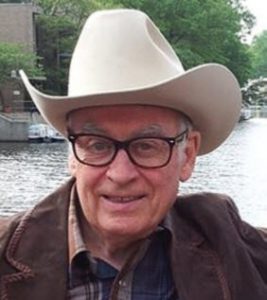 by Larry Gaughan
by Larry Gaughan
 Perhaps the best way to describe our path through life is that we are each on a spiritual journey. The thing that makes the journey “spiritual” is our constant search for ways to give meaning to our lives, using that word in its transcendent sense. We keep asking ourselves, “Why am I here?” “What is the purpose of my life?” We do this because we want our lives to be in harmony with some greater goal.
Perhaps the best way to describe our path through life is that we are each on a spiritual journey. The thing that makes the journey “spiritual” is our constant search for ways to give meaning to our lives, using that word in its transcendent sense. We keep asking ourselves, “Why am I here?” “What is the purpose of my life?” We do this because we want our lives to be in harmony with some greater goal.
But we live in a world, in a society, where there is far more focus on the material than on the spiritual. Almost none of us could carry on our lives without constant reference to the material world—even if we tried—and very few of us want to try. But, many of us still yearn to live a more spiritual life.
Marital separation and divorce are major life events that can (and should) bring the spiritual and material sides of our lives into sharp focus. These roads take us on a path away from our working life plan. We may have chosen that fork in the road, or it may have been chosen for us, or we may just have found ourselves wandering there. No matter which, both our spiritual path and our focus on the material environment are now open to changes, often major changes.
 And then, a mediator gets involved. But the immediate task of the mediation is not to help two people deal with potential new directions in their spiritual journeys, but rather to help them sort out the existing and coming changes within their material world. Where does the money come from? How do the bills get paid? Where will I live? The main focus is usually on the immediate financial decisions, and then, later, on the longer-term planning for future security.
And then, a mediator gets involved. But the immediate task of the mediation is not to help two people deal with potential new directions in their spiritual journeys, but rather to help them sort out the existing and coming changes within their material world. Where does the money come from? How do the bills get paid? Where will I live? The main focus is usually on the immediate financial decisions, and then, later, on the longer-term planning for future security.
The spiritual journey thus gets sidelined. When we are going through a marital separation leading to divorce, it isn’t easy to focus on harmony with our life goals. There are emotional goblins to deal with—frustration, fear, confusion, mistrust, anger, and at times even obsession, hate and revenge. These are the enemies of our spirituality. All of these are heavy burdens, when we carry them with us on our journeys. For example, anger can be even more of a burden when it is justified, because it’s harder then to move beyond it, even though we know it does us no good to hold on to it.
 The spiritual task of the mediator is to help people get back in touch with their better selves. One possible key to that goal is to help the clients reconnect with their most basic sources of strength. Everyone has sources of strength, although they differ from person to person and can be material as well as spiritual. The list of possibilities goes on and on—children, parents, siblings, extended family, close friends, co-workers, teachers, role models, counselors, ministers, work, one’s profession, one’s home, a denominational church, a sacred text, an AA group, a reading group, a prayer circle, music, art, a hobby, reading, poetry, yoga, family history, travel, humor, bicycling, walking or jogging, cooking, drama, writing, even pets, and even, at times, the separated spouse.
The spiritual task of the mediator is to help people get back in touch with their better selves. One possible key to that goal is to help the clients reconnect with their most basic sources of strength. Everyone has sources of strength, although they differ from person to person and can be material as well as spiritual. The list of possibilities goes on and on—children, parents, siblings, extended family, close friends, co-workers, teachers, role models, counselors, ministers, work, one’s profession, one’s home, a denominational church, a sacred text, an AA group, a reading group, a prayer circle, music, art, a hobby, reading, poetry, yoga, family history, travel, humor, bicycling, walking or jogging, cooking, drama, writing, even pets, and even, at times, the separated spouse.
Everyone’s list is different. And some of these sources of strength can also be sources of “bad vibes,” as well (such as frustration or even obsession). The sorting out is for the clients to do on their own time, both as to the priorities in their sources of strength and in focusing on the “good vibes,” not the bad ones.
The problem when spouses separate is that their material situations are more likely to seem worse, not better, at least in regard to matters of income and expenses. Options for the present may have more problems, and the future may appear to be less bright. It’s hard to pick up on one’s spiritual journey when one is worried about finances.
 So, some reframing may be needed. Remember the lyrics of the old depression era song by the Carter Family, “There’s a dark and a weary side of life. There’s a bright and a sunny side, too.” That doesn’t mean to always invite clients into the world of Pollyanna, where there is always a bright side to every disappointment. But, it does mean using the transitions of divorce as an opportunity to take advantage of both one’s fortunate and unfortunate past experiences in making wiser and more practical choices for the future.
So, some reframing may be needed. Remember the lyrics of the old depression era song by the Carter Family, “There’s a dark and a weary side of life. There’s a bright and a sunny side, too.” That doesn’t mean to always invite clients into the world of Pollyanna, where there is always a bright side to every disappointment. But, it does mean using the transitions of divorce as an opportunity to take advantage of both one’s fortunate and unfortunate past experiences in making wiser and more practical choices for the future.
The mediator’s job, of course, is to help the clients find the fairest and most practical ways to preserve and extend their material surroundings for both the present and the future. This is best accomplished when it can be done in a manner that is consistent with the clients’ own self-determination. Such a goal is an important touchstone, even though it can’t always be achieved.
Beyond that, the refocused spiritual journey still takes place post-divorce in the context of the material world. At core, it has to be a spiritual journey, not a material journey. And yet, it’s not just the search for a vision of an all-encompassing celestial light, such as Dante tried to describe at the end of Paradiso, or a mystical union with God, such as the Sufi dervishes seek to experience.
Our lives are full of stories that transcend abstractions. So, maybe our spiritual journey can, in part, be a search for stories that teach us and have a spiritual point. We can find these in the four Gospels and the Midrashim, and in the humor of Zen Buddhism, and the poetry of Mevlana Jelalu’ddin Rumi, and even in anecdotes about Albert Einstein. Or elsewhere, depending upon the particular religious or secular background each of us possesses.
 The stuff of stories is relationships. Our relationship with God may be what we have learned in a church, synagogue, mosque or temple, or it may be based upon an entity that we otherwise try to conceptualize, such as the force that we believe drives the universe, or even the absence of any of these. Or, we can believe, in addition to or in lieu of these, that our relationship with God during our lifetimes mainly plays out in terms of our relationships with other people.
The stuff of stories is relationships. Our relationship with God may be what we have learned in a church, synagogue, mosque or temple, or it may be based upon an entity that we otherwise try to conceptualize, such as the force that we believe drives the universe, or even the absence of any of these. Or, we can believe, in addition to or in lieu of these, that our relationship with God during our lifetimes mainly plays out in terms of our relationships with other people.
So, if we believe that our spiritual journey won’t necessarily unfold in abstract concepts of God, but rather is more likely to be carried out through human relationships, then our journey can take us to the spiritual as well as the material sides of those relationships. It can help us find a broader definition of “family”. It can help us find more things to respect in other people. It can make us more likely to be in touch with our own spirituality and sources of strength as we encounter these in others. And, we can learn more ways to avoid being judgmental.
As we look for the stories in our own lives, we can also appreciate the stories that other people bring to us. And thereby, we can better help them to get refocused on their new spiritual journeys through the material world of present family finances and future security.
____________
Larry Gaughan was admitted to practice law in Montana in 1957, and in Virginia in 1967. He was a tenured full professor at Washington & Lee and George Mason Law Schools. As an attorney, he is rated by Martindale-Hubbell, the national rating service for lawyers, as “AV® Preeminent™.” Larry has been a family mediator since 1980 and is a Founding Member of APFM. He is a member of the Professional Mediation Board of Standards. In September 2017 Larry received the Distinguished Mediator of the Year award from the Virginia Mediation Network at its annual conference in Richmond.
____________
This article was originally published in The Professional Family Mediator, Spring 2013.
